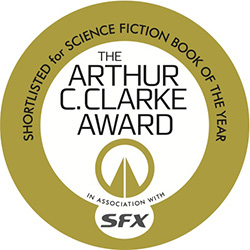Earlier today, Serendip announced the nominees for the 2017 Arthur C. Clarke Award, an annual prize presented to “the best science fiction novel […] whose UK first edition was published in the previous calendar year.” The six shortlisted works were selected from 86 submissions—a number slightly down from the hundred-plus highs seen recently.
Sitting on the panel of judges this year are Una McCormack and Shana Worthen of the British Science Fiction Association, Paul-March Russell and Andrew McKie of the Science Fiction Foundation, and Charles Christian of the SCI-FI London Film Festival. Their chair, Andrew M. Butler, had this to say about the shortlist:
“Every year our industrious judges sift through scores of novels to pick six to represent the state of the SF field. [This year] they’ve chosen a first timer and a previous winner, as well as writers in the process of building great reputations. Any of these could win—at this point I cannot begin to guess.”
The previous winner is none other than Tricia Sullivan, whose novel Dreaming in Smoke swept the Arthur C. Clarke Award in 1999. She’s nominated this year for Occupy Me (Gollancz), a “clever and complex […] thriller, complete with international hijinks, corporate corruption and an evil megalomaniac,” according to Mahvesh Murad’s review.
The first timer Butler alludes to is Yoon-Ha Lee, the Korean-American author whose Ninefox Gambit (Solaris) was described by Aidan Moher as “military SF with blood, guts, math, and heart.”
Colson Whitehead is nominated for The Underground Railroad (Fleet). The novel, about a pair of slaves seeking freedom by way of a subterranean railway, won the Pulitzer Prize for Fiction win, not to mention a sought-after spot on former President Barack Obama’s summer reading list last year.
Emma Newman is also nominated for After Atlas (Roc), a companion novel to Planetfall, “a distressing, harrowing novel that left a deep mark on” Robert H. Bedford.
Having landed on last year’s shortlist for The Long Way to a Small, Angry Planet, Becky Chambers goes two for two in 2017 with the sequel, A Closed and Common Orbit (Hodder & Stoughton). It may be “smaller in scope than the book before it, but in its focus and its force, in the sheer delight it takes in the discoveries it documents, it’s as fine and as fantastical and as fun as Chambers’ absolute darling of a debut,” I wrote.
I also had the pleasure of reviewing the last of the shortlist’s six nominees: a rewriting of the rules of the short story collection. Central Station (PS Publishing) by Lavie Tidhar is “an ambitious assemblage of thirteen tales tall but indubitably true that are all the more remarkable when read together,” and if I had to pick a winner, this, I think, would be it.

We’ll see whether or not the panel of judges agree with me when the actual winner of the 2017 Arthur C. Clarke Award is announced at a ceremony held in partnership with Foyles Bookshop on Charing Cross Road on Thursday the 27th of July, where the lucky author “will be presented with a cheque for £2017.00″—coincidence? I think not!—”and the award itself, a commemorative engraved bookend.”
Niall Alexander is an extra-curricular English teacher who reads and writes about all things weird and wonderful for The Speculative Scotsman, Strange Horizons, and Tor.com. He lives with about a bazillion books, his better half and a certain sleekit wee beastie in the central belt of bonnie Scotland.










